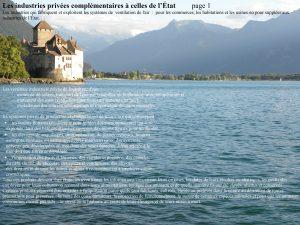Part 8
Private industries
The wellbeing, labor, hygiene and health committees do regular inspections of the facilities (factories and workshops) and products offered by the Utopia industries.
Rental committees for workshops, factories and industrial spaces are entitled to rent out the spaces necessary for the industries according to the plans and prices decided by the neighbourhoods, the units or the State.
Private industries that are complementary to those of the state
Industries that manufacture and operate air ventilation systems for businesses, homes and factories or to supplement state industries.
Private industrial water supply systems:
desalting plants, transport of water by bottles or bottles with recovery and wastewater treatment (identical to the state system), exploitation of underwater springs and import of mineral waters.
Private food production and import systems that include:
Floating gardens (ecological for the good of consumers) which are in sealed boats equipped with closed circuits for fluids.
Farming at sea in sealed vessels: shellfish, zooplankton, small shrimp, slugs, snails, jellyfish or other lower invertebrate (with weakly developed nervous systems). Water discharged into the sea must be filtered and cleaned up.
Import of fruit, vegetables, meat, fish, cereals, coffee, tea, chocolate, spices, condiments, alcohol, drugs and all other products to be consumed or used as cosmetics.
All of these products should be labeled with all information regarding: origins, dates of harvest or slaughter, pesticides used on crops or found in the animals’ feed, the animals’ age and how they were bred, kept, slaughtered and preserved.
Some products may be prohibited for import because they are manufactured, grown, raised or removed from the wild at the expense of all precautions to preserve: the health of consumers, the environment, certain animal species. It must be ensured that animals destined for consumption have not undergone: stress or barbarism during their breeding, raising and killing.
Capítulo 8 : las industrias
Las comisiones del bien estar, del trabajo, de la higiene y de la salud controlan con regularidad las instalaciones (fábricas y talleres) y los poductos que las industrias de Utopia proponen.
Las comisiones de lo alquileres de talleres, fábricas y espacios industriales estan autorizadas a alquilar las plantas y los espacios necesarios a las industrias. Los planes y los precios se deciden por barrio, por celda o por decision del estado.
Industrias privadas, complementarias a las del estado
Industrias que construyen y explotan los sistemas de ventilacion del aire : a favor de comercios, viviendas y fábricas, o para alimentar las fábricas del estado.
Industrias que construyen y explotan los sistemas de alimentacion en agua : desalacion, transporte de agua, tratamiento de aguas usadas, explotacion de pozos submarinos, importacion de aguas minerales…
Industrias que construyen y explotan los sistemas de alimentacion en comida : jardines flotantes (ecologicos) cuyos fluido son reciclados ; crías de conchas, zooplancton, gambas, caracoles, babosas, edusas y otros invertebrados inferiores (con sistemas nervios poco desarrollado)
Industrias que importan comida : frutas, legumbres, verduras, carnes, pescados, cereales, cafe, té, chocolate, especies, alcoholes, drogas, cosméticos o cualquier otro producto de consumo.
Las informaciones a cercas del origen de cada producto, las fechas de cosecha, los medios de cultivo, de conservacion y de transporte, la edad de los animales, los medios de crianza, de matanza conservacion deberan ser claramente indicados en los envases.
Algunos productos podran ser prohibidos por no respectar la naturaleza o las precauciones de salud, por poner en peligro algunas especies de animales, o por maltratarlos.
Visits: 1

